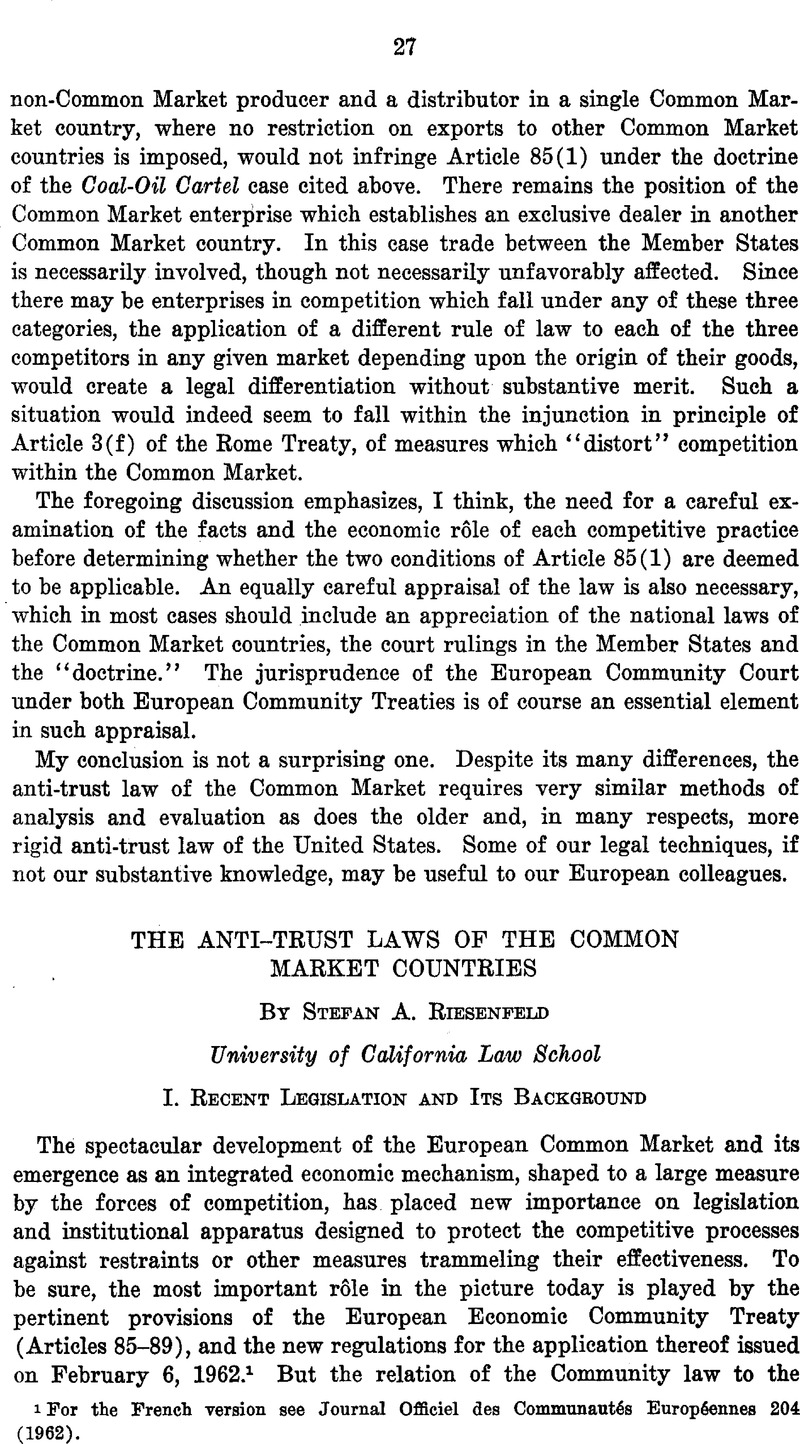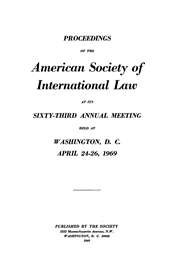No CrossRef data available.
Article contents
The Anti-Trust Laws of the Common Market Countries
Published online by Cambridge University Press: 27 February 2017
Abstract

- Type
- First Session
- Information
- Copyright
- Copyright © American Society of International Law 1962
References
1 For the French version see Journal Officiel dés Communautls Enropéennes 204 (1962).
2 For a detailed survey of the development of the law in the community countries until 1960, see Eiesenfeld, “The Protection of Competition in the European Common Market,” in 2 Stein and Nicholson, American Enterprise in the European Common Market 197 (1960).
3 Italy, Penal Code, 1930, Art. 501; Luxembourg, Penal Code, 1879, Art. 311, and Decree of Jan. 22, 1936, for the protection of the normal conditions of competition.
4 Grisoli, “Le Boycottage en Droit Italien,” 10 Travaux de L'Association Henri Capitant pour la Culture Juridique Franchise 171 (1959); Huss, “Le Boycottage en Droit Luxembourgeois,” Hid. 176.
5 For details and a translation into English, see Eiesenfeld, ‘ ‘ The Legal Protection of Competition in France,” 48 Calif. Law Eev. 574 (1960).
6 For details, see Schapiro, “The German Law Against Eestraints of Competition— Comparative and International Aspects,” 62 Columbia Law Eev. 1-48, 201-256 (1962).
7 For details, see Eiesenfeld, ‘ ‘ The Protection of Competition in the European Common Market,” loc. cit. note 2 above, at 261.
8 For details, see Del Marmol and Fontaine, “Protection Against the Abuse of Economic Power in Belgium: The Law of May 27, 1960,” 109 U. Pa. Law Eev. 922 (1961).
9 Crime of distortion of the price level.
10 Liability for tort.
11 Eight to damages of victims of crimes.
12 Nullity of transactions violative of the standards of fairness and decency.
13 Liability for tortious conduct.
14 For details, see Eiesenfeld, loo. ait. note 2 above, at 208.
15 Entrepreneurs’ Agreements Act of 1935, Art. 6, discussed ibid, at 254.
16 Decree No. 59-1004 of Aug. 17, 1959, (1959) Dalloz IV, 574.
17 Journal Officiel, Documents Administratifs, Nos. 1, 2 and 11 (1960), No. 12 (1961).
18 Cf. in this connection the discussion of the reports of the Commission Technique des Ententes by Plaisant and Lassier, Dalloz, Chron. 61 (1960) and Dalloz, Chron. 31 (1962).
19 Sirey, Lois Annotfos 120 (1960); Journal Offleiel, April 2, 1960, p. 3048.
20 Soc. Anon. Librairie Aristide Ouillet et autres, Cons. d'Etat, May 5, 1961, Dalloz 1961, 407.
21 Proc. gin., C. de Cass. c. Soeiltl Olibert, Cour de Cass., Ch. Crim., July 13, 1961, Dalloz 1961, 525, reversing Ct. of Appeals, Bordeaux.
22 Proe. gfe. Lyon c. Colin et Soc. Radio-materiel, Cour de Cass., Ch. Crim, July 13, 1961, reversing Ct. of Appeals, Lyon, Dalloz 1961, S.31.
23 Dalloz 1961, 175.
24 Ibid. 148 (Lyon, June 13, 1960).
25 Soc. de transit et transport G. Faroult c. Soc. de transit et transport G. Boy, Trib. Com. Rouen, July 21, 1961, Dalloz 1962, S. 15.
26 Ct. of Appeals of Nancy, Dec. 12, 1960, Dalloz 1961, 39.
27 Law of 1951. For application, see Dame God, Cour de Cass., July 12, 1961, Dalloz 1961, S. 98. Decree No. 61-861 of Aug. 5, 1961, implements and regulates in detail the application of the statute of 1951, Dalloz, Bull. Leg. 533 (1961).
28 For details see Riesenfeld, ‘ ‘ The Protection of Competition,” in 2 American Enterprise in the European Common Market 216 (ed. Stein and Nicholson, 1960).
29 Agreements between enterprises or associations of enterprises, concluded for the accomplishment of a common purpose, and resolutions of associations of enterprises are invalid to the extent that they are apt to affect the production or the market conditions for commerce in goods or occupational services by means of restraints of competition. This does not apply where this law provides otherwise.
30 Agreements between enterprises with respect to goods or occupational services which apply to domestic markets are void to the extent that they restrict one of the parties thereto in its freedom to determine prices or other terms in the contracts which such party may conclude with third parties in regard to the goods so supplied, other goods or occupational services.
31 Beport of the Federal Cartel Office, German Parliament 3d legislative period, Doc. No. 2734 (1961).
32 For details, see Riesenfeld, loc. cit. note 2 above, at 251.
33 Economic Competition Act 1956/1958, Art. 1 (1). As can be deduced from the statutory phraseology and its legislative history, the concept is not restricted to horizontal contractual restraints, but includes restraints of a vertical character. In a basic decision involving the legality of a decision of the Minister of Economic Affairs declaring a restrictive agreement between store-owners in a shopping center in Eotterdam to be violative of the law and subject to cancellation (Ned. Staatscourant, No. 65, pp. 5 and 6 (1959)), the Chamber for Competition Cases of the Appellate Court of Commerce and Industry held that the statutory definition required a broad and inclusive interpretation. Sociaal Economische Wetgeving 319 (1959).
34 The composition of the Commission, which includes not less than 12 regular members, is regulated by Economic Competition Act 1956/1958, Art. 28. Its internal organization and procedure are governed by Decree of Nov. 11, 1958. Decisions of the Minister are subject to judicial review, Economic Competition Act, Art. 33. The appeals are heard by a particular division of a special court, the Chamber for Competition Cases of the Appellate Court for Commerce and Industry, Economic Competition Act, Art. 35 in conjunction with Art. 1(1).
35 Decree No. 33332 of Nov. 13, 1958; reprinted in 11 WuW. 40 (1961).
36 The current exemptions are specified in Decree No. 3908 of June 3, 1960 (Ned. Staatscourant, No. 107 (I960)). They cover the following types of competition regulations:
-
(1)
(1) those that are not in force for more than one month except where they stipulate for express or implied extension;
-
(2)
(2) those concluded between one supplier and one customer which determine the price at which the customer may resell the goods obtained from the supplier;
-
(3)
(3) those among retailers in milk, milk products, and special milk products, as defined in Art. 2, par. 1, of the Ordinance establishing the Trade Organization of the Eetail Trade in Milk and Milk and Dairy Products, which aim at the rationalization of the local supply of these goods;
-
(4)
(4) those which regulate no other matters concerning competition, except (a) the joint purchase of goods; (b) the obligation of a supplier to supply specified goods exclusively to one customer, whether within a defined territory or not; (c) the obligation of a customer to procure specified goods exclusively from one supplier, whether within a defined territory or not; (d) the obligation not to exercise a specified trade or business, whether within a defined territory or not, provided that such stipulations are part of a contract of employment or for the transfer of an enterprise which engages in such trade or business; (e) the production, marketing or procurement of goods abroad or the rendition or utilization of services abroad; (f) international transportation, as far as such regulation of competition includes one or more natural or juristic persons with a foreign domicile;
-
(5)
(5) those which do not regulate economic competition within The Netherlands.
37 Economic Competition Act, Art. 41 (3) and Art. 5.
38 Eeport by the Minister of Economic Affairs to the Dutch Parliament on the Application of the Economic Competition Act during 1960, Proceedings of the Dutch Parliament, Sess. 1960-1961, Doc. No. 6348 (1961).
39 Proceedings of the Dutch Parliament, Sess. 1960-1961, Doc. No. 6348 (1961), discussed by Mok, ‘ ‘ Kartelbeleid i n de af gelopen J a r e n , ‘ ‘ 9 Sociaal Economische Wetgeving 267, at 269. The practices thought to conflict with the public interest are classified as follows:
-
1
1 Impeding the activities of certain forms of commercial organizations, such as co-operatives, purchase-combinations, department stores, branch establishments, horizontal or vertical enterprises;
-
2
2 Prohibiting the direct supply or procurement of goods so as to by-pass certain commercial middlemen;
-
3
3 Conditioning admission to a certain branch of trade upon the fulfillment of requirements of professional and business knowledge or regarding solvency which go further than those now existing for the various trades; making the admission to a trade dependent upon the approval by those who are members of an organization to regulate competition or upon a so-called criterion of need; the use of vague and subjective standards, like morality, reputation, etc.; the establishment of higher admission requirements in regard to industrial equipment, turn-over, capital, etc., than is reasonable; the establishment of requirements, of the type mentioned above, for those who apply for admission which are higher than the requirements fulfilled by those who have already been admitted; the lack of an orderly procedure and an impartial appellate tribunal in respect to decisions regarding admission;
-
4
4 Manipulating minimum prices so as to obstruct an economically warranted competition;
-
5
5 Coercing the observance of the competition regulations without sufficient guarantees for a proper administration of justice.
40 Economic Competition Act, Art. 24. 41Law Against Abuse of Economic Power, Arts. 5 and 4. 42 Ibid., Arts. 14 and 15.
41 Law Against Abuse of Economic Power, Arts. 5 and 4.
42 Ibid., Arts. 14 and 15.




